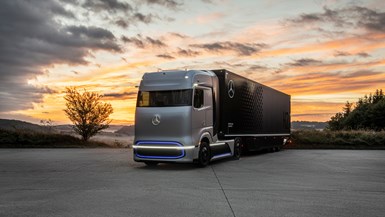Mercedes Readies Fuel Cell Truck
Sales targeted for 2024 under joint venture with Volvo
Daimler aims to be in the fuel cell business for the long haul.
The company, which has been developing the hydrogen-fueled technology for more than 30 years, took the wraps off the concept Mercedes-Benz GenH2 Truck this week in Germany.
Daimler calls it the beginning of a “fuel cell push” for its heavy-duty truck segment.
Patience, Please
But it still has a few more years before reaping the rewards of its efforts.
Customer trials of the GenH2 aren’t due to begin until 2023. If all goes well, sales will follow sometime in the second half of the decade.

Mercedes GenH2 fuel cell truck (Image: Daimler)
The new era kicked off earlier this year with a preliminary agreement between Daimler and Volvo Group to co-develop fuel cell-powered trucks. The proposed joint venture would encompass all of Daimler’s current fuel cell activities.
About the GenH2
The GenH2 targets the performance of the diesel-powered Mercedes Actros long-haul truck in terms of tractive power, range and other attributes. Daimler says the production version of the fuel cell model will have a gross vehicle weight of 40 tons and a payload of 25 tons.
Driving range is expected to be 1,000 km (621 miles) on a tank of hydrogen. This is five times the distance of next year’s all-electric variant of the Actros and double the capacity of the eActros LongHaul model due in 2024.
Liquid Assets
The GenH2 uses liquid hydrogen rather than the compressed gaseous state employed by current fuel cell cars.
Daimler says the liquid format has a significantly higher energy density than its gaseous cousin. This enables smaller and lighter storage tanks, which the carmaker notes enhances driving range and passenger cabin space.
The concept truck’s twin stainless-steel hydrogen tanks have combined capacity of 80 kg (21 gallons). The tanks are vacuum insulated for improved performance.
RELATED CONTENT
-
Multiple Choices for Light, High-Performance Chassis
How carbon fiber is utilized is as different as the vehicles on which it is used. From full carbon tubs to partial panels to welded steel tube sandwich structures, the only limitation is imagination.
-
Engineering the 2019 Jeep Cherokee
The Jeep Cherokee, which was launched in its current manifestation as a model year 2014 vehicle, and which has just undergone a major refresh for MY 2019, is nothing if not a solid success.
-
Mustang Changes for 2018
On Tuesday Ford unveiled—using the social media channels of actor Dwayne Johnson (this has got to unnerve some of the auto buff book editors)—the 2018 Mustang, which has undergone some modifications: under the hood (the 3.7-liter V6 is giving way to a 2.3-liter EcoBoost four, and a 10-speed automatic is available), on the dash (a 12-inch, all-digital LCD screen is available for the dashboard), at the tires (12 wheel choices), on the chassis (MagneRide damper technology is being offered with the Mustang Performance Package), and on the exterior (three new paint colors). And while on the subject of the exterior, there are some notable changes—a lower, remodeled hood, repositioned hood vents, new upper and lower front grilles, LED front lights, revised LED taillamps, new rear bumper and fascia.








